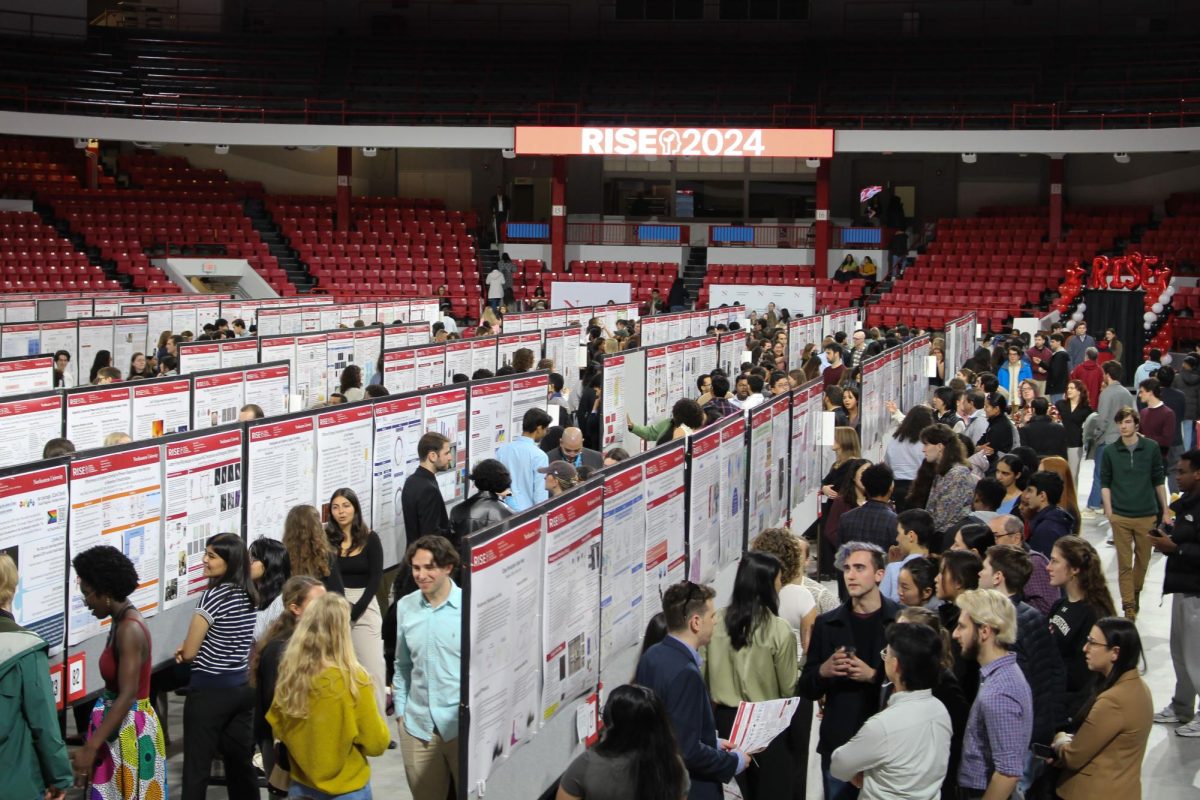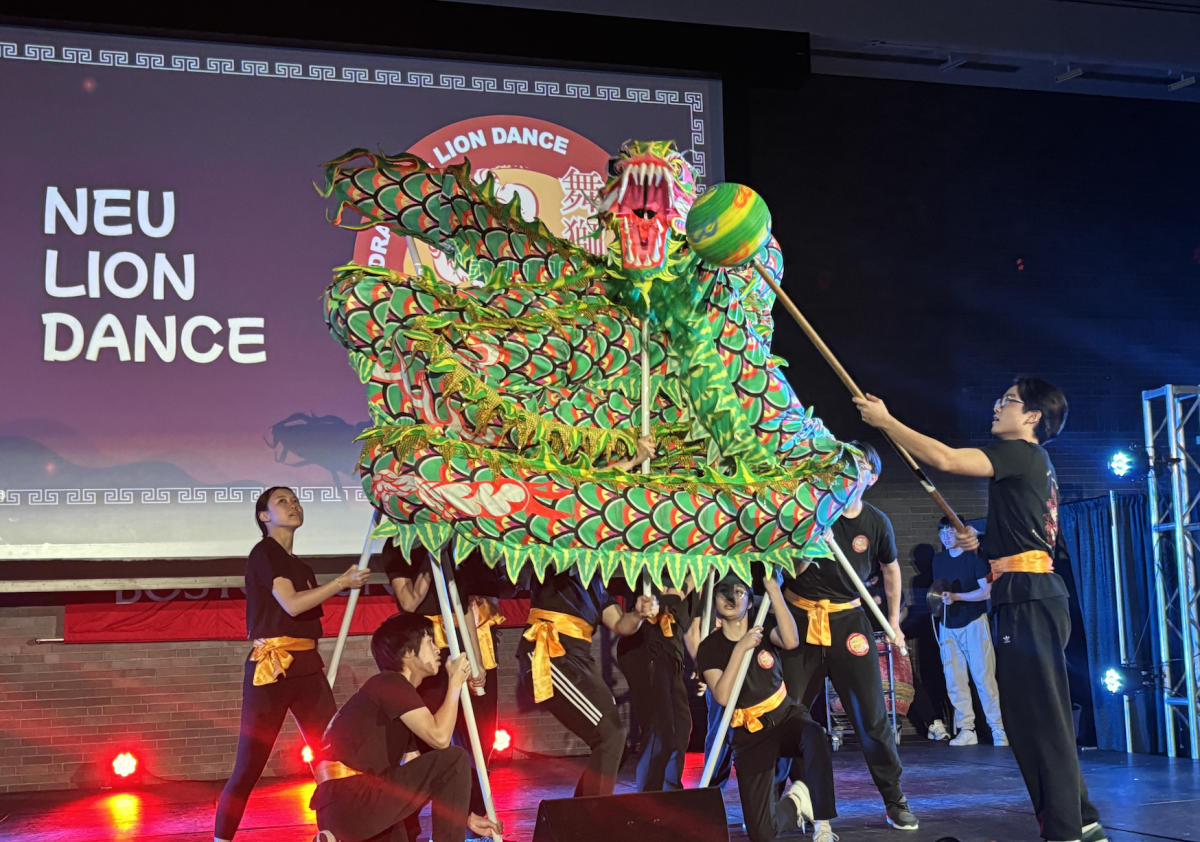As rows of iPod-plugged students climb in place on StairMasters in the Marino Center, Paul Chong is being briefed below in the lobby.
The slender freshman political science major from California is sitting with seven other cadets and listening to Michael Lopez, an older, more experienced cadet, as he goes over some tips for the upcoming weekend, which will mark a first for the novices: their first weekend of field training for the Army Reserve Officer Training Corps (ROTC).
But for now, it’s a cloudy Thursday evening; the date is March 29. Lopez, a brawny junior criminal justice major, is demonstrating what he has found to be one of the best ways to prepare a “ruck,” or backpack.
“Everything should be buttoned down and straps cinched, tied and tucked away,” he said. “In the Army, it’s better to look high-speed than like a turd.”
“You trackin’ on me?” he asked, to confirm their apprehension.
Next, he shares “tricks of the trade” with the cadets: “Write “U.S.” on the inside of the ruck. That way, when you are looking for your bag among the many, you’ll be able to spot your handwriting and still avoid breaking Army regulations.”
“Does anyone attach their Velcro straps on the inside of their helmet liner?” Lopez asked the group.
Chong raises his hand. With the other, he tilts up a cup of frothy hot chocolate. Melty mini-marshmallows approach his parted lips.
“That’s wrong,” Lopez said to Chong. “You’re going to have this irritating piece digging into you all day and there will be nothing you can do about it.”
Lopez then reviews code words that will be used during the weekend exercises.
“Does anyone know what CCP means?” he asked.
“Uhhh,” said Chong.
“Let’s say Chong gets shot while wiping his ass or something,” Lopez said. “Where are we going to pick up the body? It’s called casualty collection point.”
Chong scribbles down a note into his PDA.
Training days begin
The next day at 2:30 p.m – or 1430 military time – the Northeastern Army ROTC gathers next to Chicken Lou’s on Forsyth Street. They are about to board a big purple bus headed toward Devens Reserves Training Area, about 45 minutes northwest of Boston.
“Let’s turn this gaggle into something that means something,” Lopez told the others hanging out on the grass.
They line up in orderly rows. Most wear the traditional camouflage uniform. The older cadets stand out – they wear new digital camouflage.
Everyone seems happy to be there. Some are cracking jokes about how certain females will “look good by the end of the trip.” Such boyish humor will resound throughout their training.
They file into the bus, stowing their rucks on the way in.
“You’re ready, fired up?” yelled Major Matt Mercadante, a professor of military science at Northeastern.
“Yes sir,” replied Chong.
At the back of the bus cadets share pretzels, Pringles and humorous stories. There is much talk about NASCAR and other sports.
The biannual field training exercise trip is the first real experience Chong has had with Northeastern ROTC besides the morning physical training he does with other cadets.
“It’s like a whole new culture,” Chong said. “You walk the Army way and talk the Army way.”
He enjoys the sense of productivity and discipline that comes with it, he said. Since moving 3,000 miles from his “very liberal” California town, he feels it is one of the two things that give him a “real sense of purpose and identity.”
“My buddy, a few doors down at Speare Hall, thinks that New England has changed me,” he said in his admittedly monotone and whiny voice. “He says I’m less cheery. It’s probably because I’m stressed with schoolwork or something.”
He joined ROTC this winter after hearing about it from two cadets in one of his classes.
“Coming here, I did not have any friends,” he said. “No one knows who I am here. I felt like I had a lot to prove, so it seemed like a good choice.”
But lately, Chong’s feelings on proving himself have changed. Over the years, Chong has built big plans for the future. He wants to be a lawyer, a good parent, a pastor, a professor and a world traveler.
First, Chong faces a big life decision.
“Chong, did you contract yet?” asked Erik Pfundstein, a middler physical therapy major sitting across from him.
“No,” he replied.
New cadets to Northeastern ROTC have two years to evaluate the program before deciding whether to oblige themselves to Army duty after graduation. The contract gives cadets two options: four years of active duty followed by four years inactive time, or eight years as reserves.
“But in times like these, most reserves are being deployed,” Pfundstein said.
Chong wants to make up his mind soon.
Wake-up call
The next morning cadets wake at 0430. The moon is still out. Leaders call them to formation and they stack their Kevlar helmets on top of their rucks in neat rows. The air is frigid as they form a line for “hot chow.”
“You got to get up,” Lopez said. “We know it’s cold, but that’s the discipline, and it’s important. There has been colder and that is miserable.”
The chem lights, or glow sticks, left out the night before, have dwindled to dim phosphorescence. The cadets are encouraged to eat quickly. Steam emanates from coffee and breath.
“C’mon B.O.B.!” shouts Lieutenant Phillip Riddick, referring to the sun.
Birds can be heard chirping melodically at 0600 as the cadets march, now divided into smaller groups, from the field to wooded lanes where they engage in squad tactical exercises (STX).
On the dirt path to his first mission, Chong’s helmet bounces on his leg, causing malaise and forming a bruise. Older leaders can be heard discussing stories about Iraq.
Once a squad arrives at the location of their first mission, they practice defense. They are instructed to stop, look, listen and smell. Senior cadets are set up throughout the woods as an opposing force.
The squad members then lie prostrate in a circle, using their rucks for rifle stability despite the hard, thick sheets of ice that still cover parts of the ground.
The slowly rising sun gleams on the blonde field straw as the cadets glean for the enemy. But there is an unexpected German character who interrupts their first mission. He is playing a pesky media man who won’t go away, and the squad fails to subdue him properly. They lose points for being unable to do so.
“That German variable would have killed you if he was hostile,” said Pierce Cote, a senior international affairs major and head of ROTC recruiting and public relations at Northeastern.
He is evaluating squad performance on these missions.
There are now clear blue skies and a melancholy hum from airplanes above.
The group “scrolls the road,” or continues on, toward their next mission.
There, they flash hand signals, looking back and forth. Then, suddenly, they drop their rucks and run between lines of trees. They stomp forward past a few crushed Budweiser cans and a used metal flare casing.
Then all of a sudden there is a rapid exchange of fire. The cadets are smiling. The earthy taste of forest air becomes overpowered by the looming stench of gunpowder.
A cadet appears dead.
“The STX lanes are a blast,” Chong said. “It’s almost like a childhood fantasy. You see it in movies, but there is actually a lot of thought, tactics and procedures that go into it.”
And those tactics and procedures could come in handy in the future.
“I see most ROTC students using these squad tactics in the someday,” Cote said. “Learning to hold these rifles will definitely help them. But some will get office jobs too.”
Nowadays, most students who contract themselves to Army service will probably end up in Iraq, Cote said. “It depends on the next presidential election,” he said.
But Cote got lucky and will be stationed in Hawaii. And by obliging himself to duty after graduation, he has benefited from free tuition, a $450 stipend every month and free books.
Jon Hickey, a blonde, blue-eyed Massachusetts man who grew up in an “awesome” Army family, does not mind the prospect of fighting in Iraq.
“I want to be an infantry man,” said the freshman civil engineering major. “So if we are still in Iraq by graduation, I’ll probably end up there.”
He receives a $300 stipend every month, along with the free tuition and books that comes with the ROTC military contract.
Chong currently receives a partial scholarship to Northeastern. But in his mind, the stipends and free tuition the Army contract provides “will be of no benefit.”
“My parents handle all that stuff,” he said.
His parents, along with Cote’s, don’t understand why their offspring have joined ROTC.
“My mom screamed at me when she found out,” Chong said. “My dad just keeps asking me what I was thinking. They don’t get it.”
But his parents know he will do what he wants.
And right now he wants to continue on to the paintball mission. NUTV reporters are alongside the cadets as an exercise in media on the battlefield.
“They protected us from the paintball shooters,” said Stefanie Bair, a sophomore journalism major with NUTV. “They told us when to get down or retreat. We got shot at one time by opposing forces.”
Cote smiles as they walk by. This was when Cote realized telling girls he was soon to be stationed in Hawaii could work as a good pickup line, he said.
He gets a phone call. His ring tone is “Highway to the Danger Zone,” from the soundtrack of Top Gun.
Regardless of the girls, the piercing paintball shots continue.
Hickey is hit.
The paintball bursts, filling the air with the scent of sunscreen.
“Bullshit!” Hickey shouted. “If it was a real battle, they would have been dead.”
Chong remained unscathed – for now.
A continuing experience
After lunch, the cadets surround Lieutenant Riddick in the middle of the field.
He encourages and instructs cadets on the next exercise: a night land navigation event. He gives cadets tips on how to avoid getting “geographically embarrassed.”
“And don’t go into the danger zone,” he said. “Because that’s where shit gets blown up.”
Cadets break into groups of two. But for the LDAC, cadets will have to go it alone.
Chong partners with Rick Mooney, a sophomore from UMass Lowell. Chong doesn’t know anything about using a compass or protractor, but he helps. He holds a flashlight, the map and an index card with their assigned coordinates written on it.
The two find their first point marker. Then move on to the second. But when they are about to move on again, a problem comes up.
“Did you lose the index card?” asked Mooney.
“Uh












